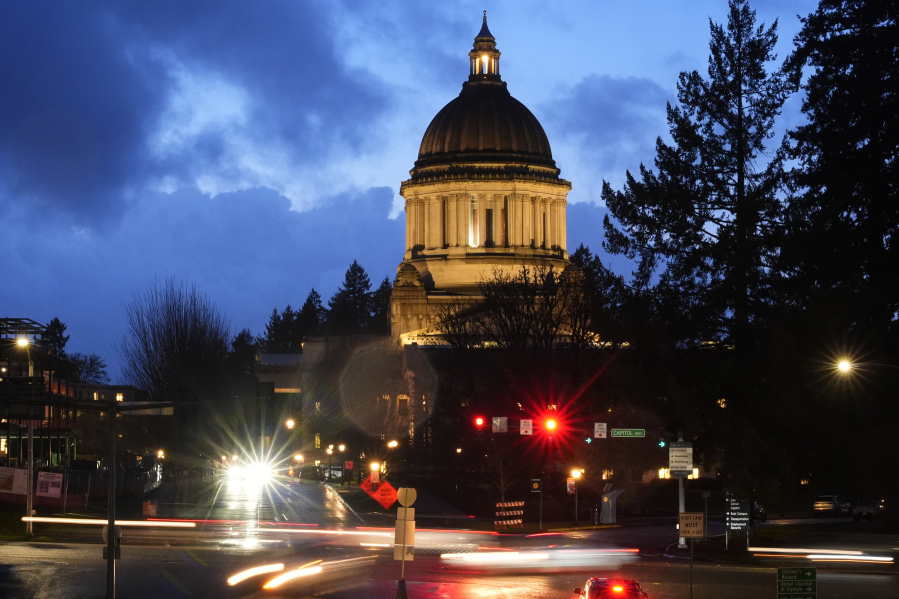OLYMPIA — The ball is now in the Legislature’s court on a slate of GOP-backed initiatives that could undo Democratic policy priorities, but it’s not clear what will happen next.
Republican backers continued their push for public hearings Wednesday, nearly a week after the sixth and last initiative — one that would allow Washingtonians to opt out of the state’s long-term care payroll tax — was certified by the secretary of state and as the short session approaches its midway point.
But Democrats in the Legislature, who command strong majorities and control the flow of bills through the Capitol, have not committed to public hearings and say they are waiting for more information about how the initiatives would each affect the budget and change state laws before deciding what to do next.
House Majority Leader Joe Fitzgibbon, D-Seattle, said Tuesday that legislators were still waiting for documents showing the potential effects of the initiatives on the state budget and “trying to unpack what we think the legal impact of each of these six initiatives would be.”
The initiatives are challenging some significant policies, like the state’s new capital gains tax and its carbon market. A repeal of either could blow big holes in the state budget.
The initiatives’ certification means they can go through a process that could have them eventually end up on the November ballot, but legislators have three options for each.
They could enact the initiative as written. They could pass an alternative to appear on the ballot with the initiative. Or they could do nothing, leaving the initiative to voters.
Many of the initiatives run counter to the Democrat-majority’s policy gains — like the capital gains tax — and are unlikely to be enacted.
Backers of the initiatives, including the initiatives’ sponsor, Rep. Jim Walsh, R-Aberdeen, rallied on the Capitol steps Wednesday and demanded lawmakers hold public hearings on the measures. Republicans assert the state constitution holds that any initiative should be prioritized over the Legislature’s other business.
House Republican Leader Drew Stokesbary, R-Auburn, said requiring hearings on the initiatives would signify they were taking precedence and give both sides a chance to make their case.
“The Legislature is supposed to consider these. We’re not necessarily supposed to pass them, but we’re supposed to consider them,” Stokesbary said in an interview Monday. “So, again, holding a hearing would be a helpful way for us to consider them because we’ll hear both the pro and the con arguments.”
Democrats maintain they have until the end of the session to act on the initiatives because they aren’t subject to the same deadlines that most bills are. And they say questions remain about the cost and constitutionality of the measures.
Along with repeals of the state’s capital gains tax, its market system to cap carbon emissions and making the long-term care payroll tax optional, the initiatives would also require public schools to notify parents and guardians about medical services provided to their student and let parents and guardians review instructional materials and medical records; lift restrictions on when police can chase suspects; and ban the state and local governments from imposing an income tax.
Most bills, with some exceptions, had to have been passed out of policy committees by Wednesday in order to survive. But the initiatives are exempt from those “cutoff” dates, said House Speaker Laurie Jinkins, D-Tacoma.
Even so, she said they were being treated by the Legislature and House Democrats “like any other bills,” with staff digging into their legal and budget implications.
“We have the same obligation to look at it in that way,” Jinkins said. “And so we want to make sure that we’re clear about that before we start having hearings on it.”
“We frequently don’t hold hearings on bills that are going to cost $2 billion to the budget,” Jinkins said. “We frequently don’t hold hearings on bills where we get advice from staff that the bill itself is unconstitutional.”
The state’s carbon market, which faces a repeal by an initiative, has raised $1.8 billion in its first year.
Fitzgibbon said there was more ambiguity about what the consequences of the initiatives would be compared to regular legislation, which is introduced by lawmakers and drafted by nonpartisan staff. Fiscal notes — the documents showing a bill’s effect on the state budget — were requested for each initiative on the first day of the session, he said.
On the parental notification initiative, for example, Fitzgibbon said many aspects of the proposal are in current law, but they want to understand any impacts on health privacy for youth.
“The truth is, we’ve been spending a lot of time talking internally about, what do we think these initiatives do?” Fitzgibbon said.



